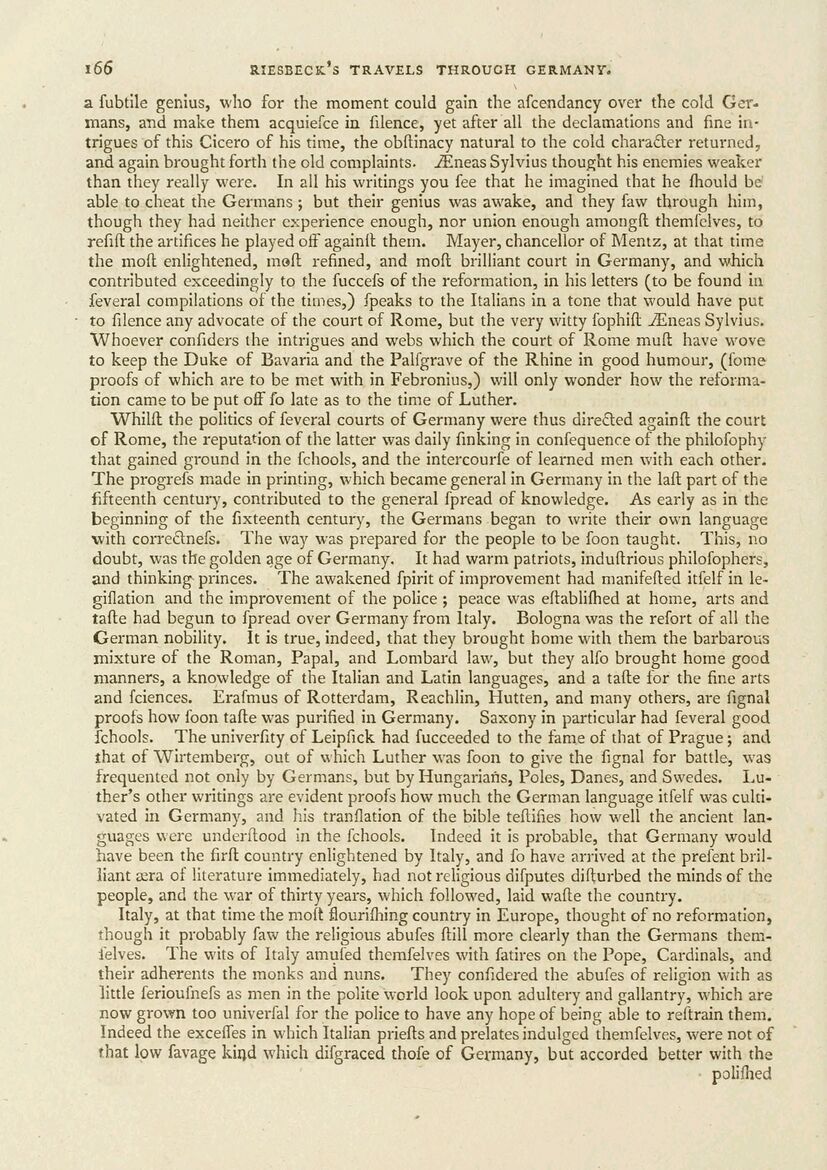
Full resolution (JPEG) - On this page / på denna sida - Pages ...

<< prev. page << föreg. sida << >> nästa sida >> next page >>
Below is the raw OCR text
from the above scanned image.
Do you see an error? Proofread the page now!
Här nedan syns maskintolkade texten från faksimilbilden ovan.
Ser du något fel? Korrekturläs sidan nu!
This page has never been proofread. / Denna sida har aldrig korrekturlästs.
166 RIESBECK’s TRAVELS THROUGH GERMANY.
a fubtile genius, who for the moment could gain the afcendancy over the cold Ger-
mans, and make them acquiefce in filence, yet after all the declamations and fine in-
trigues of this Cicero of his time, the obftinacy natural to the cold character returned,
and again brought forth the old complaints. AXneas Sylvius thought his enemies weaker
than they really were. In all his writings you fee that he imagined that he fhould be
able to cheat the Germans; but their genius was awake, and they faw through him,
though they had neither experience enough, nor union enough amongft themfelves, to
refit the artifices he played off againft them. Mayer, chancellor of Mentz, at that time
the moft enlightened, meft refined, and moft brilliant court in Germany, and which
contributed exceedingly to the fuccefs of the reformation, in his letters (to be found in
feveral compilations of the times,) {peaks to the Italians in a tone that would have put
- to filence any advocate of the court of Rome, but the very witty fophift A®neas Sylvius.
Whoever confiders the intrigues and webs which the court of Rome muft have wove
to keep the Duke of Bavaria and the Palfgrave of the Rhine in good humour, (fome
proofs of which are to be met with in Febronius,) will only wonder how the reforma-
tion came to be put off fo late as to the time of Luther.
Whilft the politics of feveral courts of Germany were thus directed againft the court
of Rome, the reputation of the latter was daily finking in confequence of the philofophy
that gained ground in the {chools, and the intercourfe of learned men with each other.
The progrefs made in printing, which became general in Germany in the laft part of the
fifteenth century, contributed to the general fpread of knowledge. As early as in the
beginning of the fixteenth century, the Germans began to write their own language
with correctnefs. The way was prepared for the people to be foon taught. This, no
doubt, was the golden age of Germany. It had warm patriots, induftrious philofophers,
and thinking princes. ‘The awakened fpirit of improvement had manifefted itfelf in le-
giflation and the improvement of the police ; peace was eftablifhed at home, arts and
tafte had begun to {pread over Germany from Italy. Bologna was the refort of all the
German nobility. It is true, indeed, that they brought home with them the barbarous
mixture of the Roman, Papal, and Lombard law, but they alfo brought home good
manners, a knowledge of the Italian and Latin languages, and a tafte for the fine arts
and fciences. Erafmus of Rotterdam, Reachlin, Hutten, and many others, are fignal
proots how foon tafte was purified in Germany. Saxony in particular had feveral good
{chools. The univerfity of Leipfick had fucceeded to the fame of that of Prague; and
that of Wirtemberg, out of which Luther was foon to give the fignal for battle, was
frequented not only by Germans, but by Hungariatis, Poles, Danes, and Swedes. Lu-
ther’s other writings are evident proofs how much the German language itfelf was culti-
vated in Germany, and his tranflation of the bible teftifies how well the ancient lan-
guages were under{tood in the fchools. Indeed it is probable, that Germany would
have been the firft country enlightened by Italy, and fo have arrived at the prefent bril-
liant zera of literature immediately, had not religious difputes difturbed the minds of the
people, and the war of thirty years, which followed, laid wafte the country.
Italy, at that time the moft flourifhing country in Europe, thought of no reformation,
though it probably faw the religious abufes {till more clearly than the Germans them-
telves. The wits of Italy amufed themfelves with fatires on the Pope, Cardinals, and
their adherents the monks and nuns. They confidered the abufes of religion with as
little ferioufnefs as men in the polite world look upon adultery and gallantry, which are
now grown too univerfal for the police to have any hope of being able to reftrain them.
Indeed the exceffes in which Italian priefts and prelates indulged themfelves, were not of
that low favage kind which difgraced thofe of Germany, but accorded better with the
polifhed
<< prev. page << föreg. sida << >> nästa sida >> next page >>